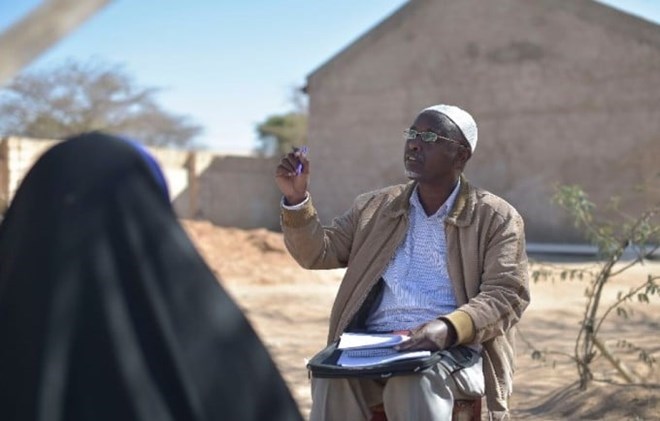Saturday August 17, 2024
By Abdirahim Hussein (HUSU)

FILE - A data collector from the Somali Health ad Demographic Survey (SHDS). March 20, 2022. CREDIT: UNFPA
For Somalia to truly thrive—with security, a decent standard of living for all, and good governance—we must address a fundamental requirement: understanding our population. Achieving national goals requires careful planning and reliable data, beginning with a comprehensive census. Although Somalia has faced formidable challenges, including war, famine, and political instability, a well-conducted census could be the transformative step the nation desperately needs.
One of the pillars of a functioning democracy is the integrity of elections. A census provides the critical data we need to know exactly how many citizens are eligible to vote. Without this accurate voter information, the legitimacy of elections is at risk, with potentially devastating consequences for our democratic future. But a census is not just about elections; it's about ensuring every Somali has access to essential services—food aid, healthcare, education, and infrastructure. Inaccurate population data leads to misallocated resources, leaving many in need and widening inequalities.
Imagine a child in a rural area missing out on education because resources were allocated to another region based on outdated data. Or a family struggling to access healthcare because the nearest clinic is hours away, located in an area wrongly estimated to have higher needs. These are the human costs of not having accurate population data.
Building a Just Society
Social peace is built on a foundation of justice, where citizens feel their voices are heard and their needs met. For Somalia, achieving this vision requires a more democratic model grounded in reliable data. A census provides the vital information needed to create a governance system that genuinely reflects the will of the people. By drawing on best practices worldwide, Somalia can develop a democratic model suited to its unique context. This could involve establishing a civil service of experts to support political leaders, ensuring that those in power have the correct information to make informed decisions.
Progress Amidst Challenges
Despite the many obstacles, Somalia has made significant strides. From debt relief to lifting the arms embargo, joining the East African Community (EAC), and securing a seat on the United Nations Security Council, Somalia has demonstrated resilience and determination. Yet the last comprehensive national census was conducted in 1975. Since then, attempts to conduct a census have been hampered by civil war, ongoing conflict, security concerns, and inadequate infrastructure. The absence of current data not only hinders decision-making but leaves entire communities invisible, further entrenching disparities.
For a national census to succeed in Somalia, several key areas need to be addressed:
- Planning and Coordination: Establish a national census planning committee, develop a detailed timeline, and secure the necessary budget.
- Training and Capacity Building: Implement comprehensive training programs for census workers and strengthen relevant institutions.
- Data Collection Tools and Methods: Use standardized questionnaires, GIS mapping, and digital data collection methods to ensure accuracy.
- Logistical Arrangements: Ensure sufficient transportation and procure all necessary materials.
- Security Measures: Coordinate with security agencies to protect census workers and ensure the safe collection of data.
- Public Awareness Campaign: Develop a communication strategy to educate citizens about the importance of the census and build trust in the process.
Collaboration for Success
Conducting a census of this scale requires coordinated efforts from a wide range of stakeholders:
- International Organizations: The United Nations Population Fund (UNFPA), United Nations Development Programme (UNDP), World Bank, and African Development Bank (AfDB) can provide technical assistance, funding, and training.
- Government Bodies: The National Bureau of Statistics (NBS), Ministry of Planning, Investment, and Economic Development, and regional and local authorities must lead and coordinate the efforts.
- Non-Governmental Organizations (NGOs): Both local and international NGOs can assist with community mobilization, public awareness campaigns, and logistical support, especially in hard-to-reach areas.
Somalia is on the right track, displaying remarkable resilience in the face of adversity. A national census is not just a technical exercise; it's a critical step toward building a stable, just, and prosperous future. Imagine a Somalia where every citizen is counted, every voice is heard, and every need is met. With meticulous planning, collaboration, and international support, Somalia can conduct a successful census—laying the foundation for a democratic society that genuinely reflects the aspirations and needs of its people.
Abdirahim Hussein (HUSU) is a Senior SNBS Advisor at Somalia's Ministry of Planning, Investment and Economic Development (MOPIED)